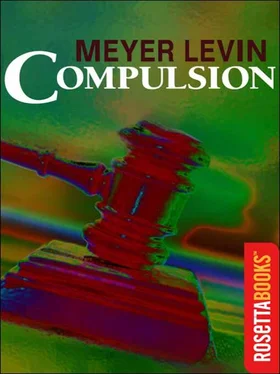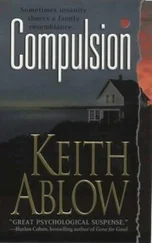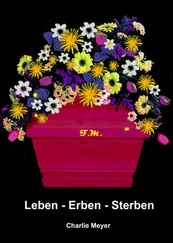Ruth brought him down neatly. Could someone as conceited as he be in love? He said “touché”, and she pressed his hand and smiled, and then she said the essence of love was completely knowing each other. She hoped if she ever loved someone, they would always tell each other everything, no matter what they did, even infidelities.
Her words were banal, Judd told himself – she was after all ordinary – and yet the tug of her was more powerful than ever. He told himself that the two of them really looked like an ordinary nice college couple. Was that what he wanted so much, wanted to tears?
Something far inside him was laughing. It was as though he were with Artie, laughing at the sight of Judd sitting here with this girl. Then a thought came, one of those awfully simple things you suddenly recognize, things that everyone else must always have known. To experience everything, to experience every possibility of life – why, that included not only the unusual, the bizarre, the depths of evil, but it should have included the other side too; the other range of experience should have come first. How could he, now? How could he ever experience the most everyday common feelings, love and truth, with a girl like this? How could he know whether after all this common thing might not be the most important of all? An overwhelming sense of deprivation came to him because of what he had missed. And he had gone too far away now ever to secure it. Why had he not at least tried that ordinary experience before he went this far?
In the dim pink lamplight, Judd knuckled his eyes, as if he had a headache. Ruth suspected there were tears. But why? Why?
“Is something very wrong?”
“Yes,” he said.
“Tell me.”
“I can’t.”
And Ruth began to feel that it was more than youthful melancholy, more than the dark self-dramatizing in men, when they assume a Hamlet moodiness and seek comforting. This was something serious and real. But what evil could she know? Seeing Judd so profoundly depressed, there came to her only the dread bogeys of childhood fantasies, used to explain any threat of great sorrow. They were the primal threats of girlish imaginings. What would I do if I loved a man and there was insanity in the family? There even appeared the spectre of the ghastly disease: perhaps he had caught syphilis in his running around with Artie. But she cleared all that away.
No, perhaps much more reasonably Judd was still disturbed about the occurrence on the beach. Being alone with her like this, that powerful male sexual desire that boys had to cope with, so much more powerful a desire than women’s, must be upon him again. It was a need that made men so miserable. He was perhaps afraid it would again force him to do something that would spoil things. But ugly as the moment had been, Ruth wanted to comfort Judd, to tell him she understood. This was the compelling thing of nature, and especially if you loved – if you began to have a feeling for a man – you only sympathized with him for it. True, that moment on the beach had had another kind of strangeness, disturbing, for an instant even terrifying, but Judd had mastered himself for her sake, and in a sense that made Ruth feel he did respect her. If he was “different”, even moodier than Sid, this was perhaps what attracted her; this was the challenge of him. Everyone knew he was brilliant, and it would take an extraordinary girl, an extraordinary woman, to be equal to a man like Judd. And he had never found one, he had been so lonesome. Now perhaps she could give him the first happy feeling of true friendship, and even love might develop.
“Judd,” she said, “if it’s something about me, you mustn’t worry. You’d never hurt me.”
He shook his head. “I know I’d hurt you. I’d make you miserable.”
She touched his hand, and moved her head forward with the tender smile of a woman who has no wish to belittle a man’s suffering but yet sees that other times will come. “Let’s dance,” she said.
Then later, I picture them sitting in a car in a small woods along the Desplaines River. The despondency has come over Judd again, even more darkly. Between kisses, Ruth chides him, “But, Judd, what’s so terrible? You’re young, bright, rich; you’ll get what you want out of life.”
“You don’t know,” he says. “I just feel-”
Gradually she begins to feel his hurt, to feel it powerfully, deeply, to know that there is some unknowable sorrow stemming perhaps even from the brilliance of his mind – his mind apprehending some fated evil that ordinary people cannot see, some inescapable world sorrow. And Ruth begins to believe that anything must be done to assuage such a hurt that comes only from very life itself. If sexual release may lift away even a little of this dreadful pain in man, then the whole structure of purity becomes meaningless.
She wants, by some magic womanly touch, to dispel his ache. Yet it is not her ignorance or even her own innocence, she feels sure, that impedes her. This trouble of his is something uncommon, as Judd is uncommon. This intensity of pain is not merely what other men feel.
She draws his head down to her bosom. “Tell me, tell me,” she whispers, desperate over her own inadequacy – a girl trying to play the rôle of a woman. He is silent, caught in some bleak indescribable horror.
Her dress has small buttons all down the front, and in a chaotic wish to help him, Ruth undoes the buttons and draws down the edge of her chemise. His cheek rests against her bare breast. As it touches her, Ruth feels a warm pulse through her entire body, and in her sex, and she wonders whether now, now she will become a woman. His lips touch, and she wishes that her body could draw from him all the hurt, all the grief of living. She places her hand on his head. She feels a slight shudder going through his body. Is he weeping?
Judd sees the boy. For the first time, he sees the face of the dead boy – a kid’s face gazing up at him from the night-time water. And staring at him with a child’s unblinking candour, the face becomes his own.
Ruth is white-faced. She sits utterly still. And she hears Judd say, “I wish I had never been born.”
The words stagger Ruth; there is a strangeness in the intonation. It is not the way people usually say this.
She can only press his head tightly, feeling in herself a great distress that she cannot help this man, a great tugging to relieve his suffering, and a frightened wonder – can this be love?
Judd puts his hand on the gearshift. With an effort of will, he starts the car. Once the machine is in movement it is easier. He even is able to tell himself he has done a noble thing. He could have had Ruth tonight, and he refrained. Perhaps it will count, in a kind of bargain exchange with his fate. Perhaps it will help him not to get caught.
On the next day – the day Lieutenant Cassidy secured the list of Seemore spectacle owners – Judd was telling Artie how he had made Ruth. Judd assured himself he was talking that way only to keep himself from really talking about her to Artie. So he told how he had lifted her out of the car. Artie’s face wore a loose, sceptical look; no one was taking him in. That meant he was believing it. “You bastard!” Artie cried. “Why didn’t you take me along? You know I always had my eye on her; I knew she was tail. Let’s the two of us get her tonight-”
Judd shrugged. He wasn’t interested in her any more, he said.
“Okay, you bullshitter. I don’t believe you ever laid her.”
That was when the maid came in to say some gentlemen wished to see Judd.
Artie and Judd were in the library playing casino, not even for money; the débris of the engagement party was still around them. Now Artie sank far down in his chair, holding his cards in front of his face.
Читать дальше












